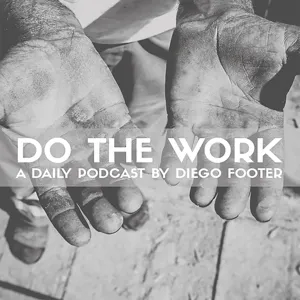Podcast Summary
Navigating the Challenges of New Management: New managers face time management, team conflicts, and identity shifts. Planning professional development, dealing with disillusionment, and setting priorities and boundaries can help.
Becoming a manager for the first time can be a transformative experience, bringing both challenges and personal growth. New managers often grapple with managing their time, team conflicts, and their own identity shift. In this HBR On Leadership episode, leadership coach Jen Derry provides insights on how to navigate these challenges, including planning professional development, dealing with disillusionment, and setting priorities and boundaries. Several new managers share their experiences, expressing feelings of responsibility, growth, overwhelm, and even loss of joy and innocence. These sentiments resonate with many, highlighting the emotional complexity of transitioning from an individual contributor to a manager.
Navigating the Discomfort of a New Managerial Role: New managers can feel uncomfortable and disoriented when transitioning into leadership roles, but intentional reflection and seeking out role models can help build confidence and a new perspective.
Transitioning into a managerial role can be a challenging experience that involves a significant shift in identity. This change can be uncomfortable and even disorienting, as individuals may feel they have lost touch with the aspects of their work that once brought them pride and fulfillment. However, with time and intentional effort, new managers can emerge from this stage with newfound confidence and a different perspective on how to navigate their professional world. One important aspect of this identity work is reflecting on who we want to be as managers and seeking out role models whose qualities we admire and can emulate. It's also crucial to recognize that it's normal to feel uncertain and to learn from our experiences, especially when facing difficult tasks such as providing critical feedback. In summary, embracing the discomfort of the managerial role and intentionally defining our identity as leaders can help us grow and thrive in our careers.
Navigating the Transition to Management: Allow time for adjustment, set a time frame for trying management, and remember that growth often comes with discomfort.
Transitioning into a management role can be an exciting yet challenging experience. Initially, the promotion brings joy and a sense of achievement. However, as time passes, managers might feel a sense of loss, as they miss the hands-on work and the clear-cut goals that come with being an individual contributor. This period of adjustment can lead to feelings of doubt and uncertainty. To navigate this phase, setting a time frame for trying management and then reassessing the decision can be helpful. Remembering that growth often comes with discomfort and understanding that the discomfort is a necessary part of the process can also be valuable. As Ginni Rometty, former CEO of IBM, noted, taking risks and growing from the discomfort are essential for career advancement.
Assessing your fit in the company: Consider your feelings towards work, energy levels, and opinions of trusted colleagues to determine if a management role is right for you. If issues arise, address them with your manager.
Considering whether or not you want to pursue a management role at your current company is an essential aspect of your career development. The culture and environment of a workplace significantly impact your feelings of success and satisfaction. To determine if you're in the right place, observe how you feel about work and your energy levels at the end of the day. Pay attention to the opinions of trusted colleagues and whether they're leaving the company. If you're feeling disillusioned, consider making a list of issues and working with your manager to address them. Remember, as a manager, you have newfound power and authority to effect change. Don't overlook the value of your fresh perspective.
Navigating the Challenges of New Management: New managers must focus on their tasks and boundaries, making small actions to positively impact team members, and prioritize self-care to prevent burnout, especially for women in today's economic climate.
Becoming a manager involves a significant shift in responsibility, which can be overwhelming. New managers may feel pressure to save and help everyone, but it's essential to recognize boundaries and focus on moving things forward each day. Managers can make a significant impact on their team members with small actions, leading to positive ripple effects. To prevent new managers from feeling paralyzed by their new role, it's crucial to take things one step at a time and focus on the tasks at hand, rather than trying to solve all their employees' personal problems. Additionally, in today's economic climate, women managers may experience increased stress and burnout due to having to do more with fewer resources. To cope, prioritizing self-care, delegating tasks, and setting realistic goals are essential.
Effectively managing workload for personal growth and professional success: Self-awareness, confidence, clear communication, focusing on best work, and prioritizing tasks are crucial for managing workload effectively and avoiding burnout.
Managing workload effectively is crucial for both personal growth and professional success. However, it can be challenging to determine the limit of what one can handle and when to say no. Overcommitting can lead to decreased quality of work and potential burnout. Self-awareness, confidence, and clear communication are essential in setting boundaries and prioritizing tasks. Remembering to focus on "doing your best work" can help maintain a neutral perspective and foster collaboration. Setting aside time each week to prioritize tasks is a helpful managerial strategy. Ultimately, finding a balance between learning, proving oneself, and avoiding overwhelming workload is a continuous process.
Reflecting on real situations and learning from them: Reflect on experiences and adapt your management style based on priorities and values, rather than strictly following a predefined style.
Finding your management style doesn't have to be a rigid process. It's important to identify your priorities and focus on quick wins while also planting seeds for future success. Leadership development can be a combination of preparation and learning on the job. You don't need to define yourself by a specific leadership style, but rather lead with your values and learn from those who set great examples. Tanya, a first-time manager in the public transportation industry, shared her experiences of managing both priorities and people, and how she's grown since her last interview. She emphasized the importance of reflecting on real situations and learning from them, rather than strictly adhering to a predefined management style.
Navigating the balance between competence and likability: Leaders need to balance the desire to be liked with the need to be respected. Prioritize the important over the urgent, avoid striving for perfection, and set boundaries to ensure long-term sustainability.
Becoming a leader involves navigating the balance between competence and likability. While technical skills are essential, leaders also need to consider how they want to be perceived by their team. Some people may prioritize being respected over being liked, while others may aim for a balance. Struggles with this balance are common, and it can take time for new managers to find their footing. During the conversation, Tanya shared her experience of becoming a manager and the challenges she faced in balancing the desire to be liked with the need to be respected. She discussed the increase in confidence she gained but also the stress and time management issues that came with the role. Amy offered some advice, suggesting that leaders separate the urgent from the important and prioritize accordingly. She also encouraged leaders to consider whether striving for perfection is sustainable and whether the cost of not meeting that standard is worth it. Ultimately, it's important for leaders to set boundaries and avoid working excessive hours to ensure long-term sustainability.
Striving for 75% can be enough: Seeking balance between independence and help, recognizing everyone goes through growth, and being kind to oneself are keys to personal and professional development.
Striving for perfection can hinder personal and professional growth. The speaker shared their experience of realizing that 75% can be good enough and moving things along in the right direction is often more beneficial than dragging things out for perfection. They also acknowledged the importance of seeking help when needed, but being independent and learning to trust one's own decision-making abilities. The speaker also reflected on the importance of being easy on oneself and recognizing that everyone goes through similar thought processes and experiences growth over time. Overall, the conversation highlighted the importance of balance between independence and seeking help, and the need to be kind to oneself in the process of personal and professional development.
The Importance of Prioritizing Personal Growth: Careers remain busy, but intentional prioritization is key to making time for personal growth. Discuss career goals with managers and consider deprioritizing other tasks to invest in important certifications or training.
Personal growth and development can stall when focusing too much on others' growth and work commitments. The speaker shares her experience of wanting to obtain a PMP certification for years but couldn't due to lack of time. She emphasizes the importance of self-compassion and understanding that finding time for professional development is a challenge. The speaker suggests discussing career goals with managers during annual reviews and potentially deprioritizing other tasks to make time for important certifications or training. Ultimately, the realization is that careers remain busy, and finding time for growth requires intentional prioritization. Despite a previous negative experience with management, the speaker expresses a desire to try it again, recognizing the value of mentoring and strategic planning.
Exploring people management opportunities can lead to personal growth: Embracing leadership roles can lead to unexpected rewards and personal growth, even in unsupportive work environments
Giving yourself a chance to succeed in people management can lead to personal growth and joy, even in organizations where you feel supported. This was emphasized by leadership coach Jen Derry during her conversation with Kelsey Alpeo and Amy Bernstein on the Women at Work podcast. Jen acknowledged that not everyone is meant to be a manager, but for those who are interested, the benefits can be significant. Amy, who initially expressed hesitation about management, shared how her perspective had shifted in just a few weeks, leading her to consider taking on a leadership role. The podcast serves as a reminder that stepping out of our comfort zones and trying new things, especially in the realm of leadership, can lead to unexpected rewards.





